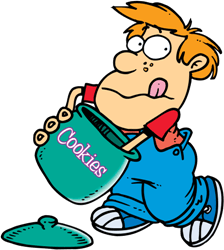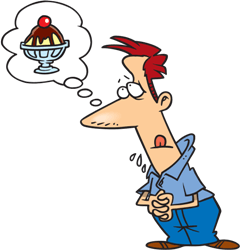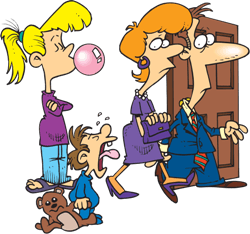Phrasal-Prepositional Verbs
A phrasal verb is a verb that is combined with an adverb or a preposition. The combination creates a new meaning.
Click Here for Step-by-Step Rules, Stories and Exercises to Practice All English Tenses
Sometimes, a verb is combined with an adverb AND preposition for a whole new meaning. We call these Phrasal-Prepositional Verbs.
Verb + Adverb + Preposition = Phrasal-Prepositional Verb
Example:
run + out
+ of
= run
out of (= use everything)
Example
sentence:
We will run
out of
cookies if you continue eating them!

Here is another example:
But his doctor told him that he needs to eat less.
He eats too much ice cream, and it's bad for him.
His doctor told him to cut down on sweets.
("Cut down on" means to use less of something.)

So as you can see, some verbs can be three words long! They are called phrasal-prepositional verbs. Now let's learn how to use them correctly.
There are some things you need to remember about these special, longer phrasal verbs:
- They are always transitive,
meaning that they always have an direct
object. The action is always done to something
or someone else.
- They are also always inseparable.
The object
must always come at the very end of the verb, after the
preposition. It cannot go in the middle of the phrasal verb.
See these articles:
How to Study Vocabulary WordsActivities for Teaching Vocabulary: How Can You Teach (or Learn) New Words?
Now look at the common phrasal-prepositional verbs below. The examples show the correct and incorrect way to use them.
Study the examples and write some of your own to help you remember them.
1. Cut down on
As we saw above, this phrasal verb means to reduce how much we use or
eat of something.Examples:
- Correct:
Priscilla has to cut
down on hamburgers and other greasy food. It's bad for her
cholesterol.
Incorrect: Priscilla has to cut hamburgers and other greasy food down on. It's bad for her cholesterol.
Incorrect: Priscilla has to cut down hamburgers and other greasy food on. It's bad for her cholesterol.
(Remember that we can't separate these phrasal verbs!)
- Correct:
Cecil loves pizza! He could eat the whole thing himself, but he is
trying to cut
down on junk food because he's been gaining weight.
Incorrect: Cecil loves pizza! He could eat the whole thing himself, but he is trying to junk food cut down on because he's been gaining weight.
(Remember that the object must always come directly after the phrasal verb.)

2. Come up with
This phrasal-prepositional verb means to have an idea or find a
solution after
thinking for a long time.Examples:
- Correct: Kelly
came up with
a wonderful idea for the school play, and her teacher picked it!
Incorrect: Kelly came a wonderful idea for the school play up with, and her teacher picked it!
- Correct: Einstein
thought and studied a lot, and he came up with
a brilliant equation to represent his theory of relativity.
Incorrect: Einstein thought and studied a lot, and he came up a brilliant equation to represent his theory of relativity with.

3. Get along with
This phrasal verb means to have a good relationship with someone, or to
enjoy being with them.This is how we express this meaning in the United States. In Britain, we express the same meaning with the phrasal verb get on with.
Examples:
- Correct: Do
you get along
with your new co-worker? She seems very nice.
Incorrect: Do you get your new co-worker along with? She seems very nice.
- Correct: Lindsey
gets along
with the other members of the chorus very well. They have
a great time practicing and performing together.
Incorrect: Lindsey gets along the other members of the chorus with very well. They have a great time practicing and performing together.

4. Look up to
This phrasal verb means to admire someone or to have someone as a role
model.Examples:
- Correct: Lots
of children look
up to their favorite actors or singers, so it's important
for these stars to be good role models.
Incorrect: Lots of children their favorite actors or singers look up to, so it's important for these stars to be good role models.
- Correct:
Geoff looks up
to his father. He wants to be responsible and supportive
like him when he grows up.
Incorrect: Geoff looks his father up to. He wants to be responsible and supportive like him when he grows up.

5. Put up with
This phrasal verb means to deal with or endure a person or situation
that we don't like.Examples:
- Correct: Just
do your best to put
up with the new trainee. I know he can be annoying, but
soon he'll be transferred to a different department.
Incorrect: Just do your best to put the new trainee up with. I know he can be annoying, but soon he'll be transferred to a different department.
- Correct: Jodie
and Rick just couldn't put
up with the baby crying anymore! They decided to get a
babysitter for the evening and enjoy a nice evening at the theater.
Incorrect: Jodie and Rick just couldn't the baby crying put up with anymore! They decided to get a babysitter for the evening and enjoy a nice evening at the theater.

Once
you understand the meaning of these phrasal verbs, try writing some
examples of your own to help you remember them. Then you can move on to
learning a new set.
Be sure to review the other pages in this section
and keep on studying. Phrasal verbs can be tricky, but with lots of
practice, you'll be a pro!
Keep practicing with these important phrasal verbs and be sure to visit the other pages in this section. Practice makes perfect!
Separable and Inseparable Phrasal Verbs
Illustrated Worksheet on Phrasal Verbs
Phrasal-Prepositional
Verbs (this page)
Get Updates, Special Offers, and English Resources
Download your FREE GIFT (the first two chapters of
English Short Stories Book and Workbook)
as soon as you join!

By submitting your email, you consent to receiving updates and newsletters from us and to the sharing of your personal data with third parties for the purposes of sending you communications. We will not spam you. You can unsubscribe at any time. For more information, please see our privacy policy.
Return
from Phrasal-Prepositional Verbs to English Phrasal Verbs
Return to
Really Learn
English Home Page








